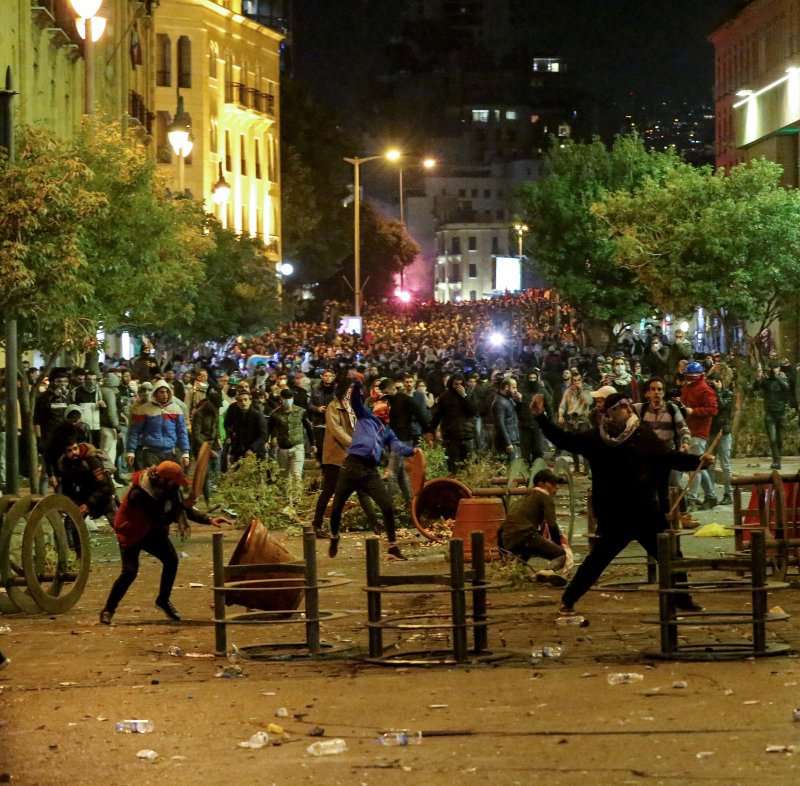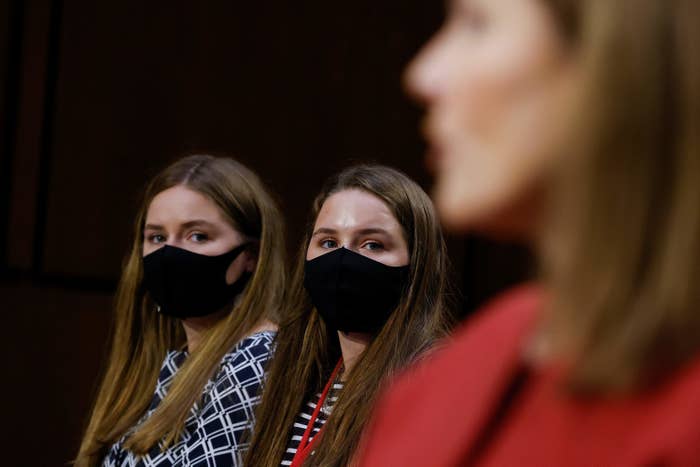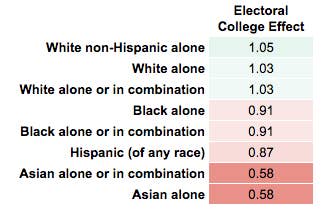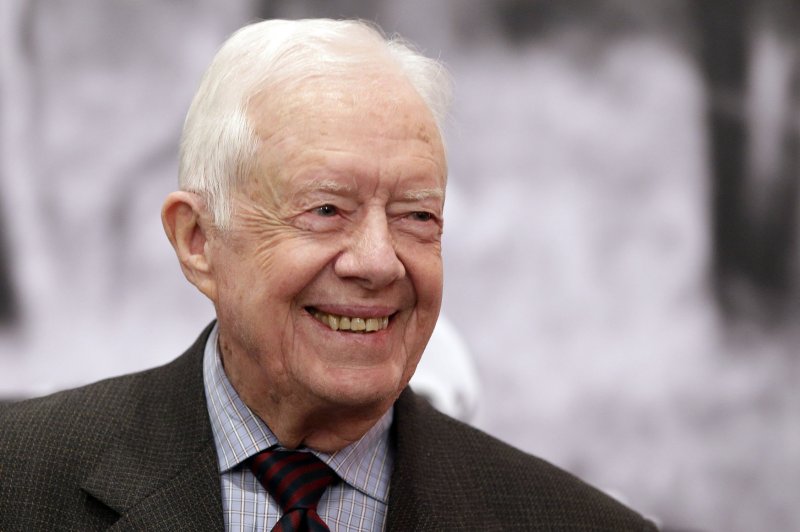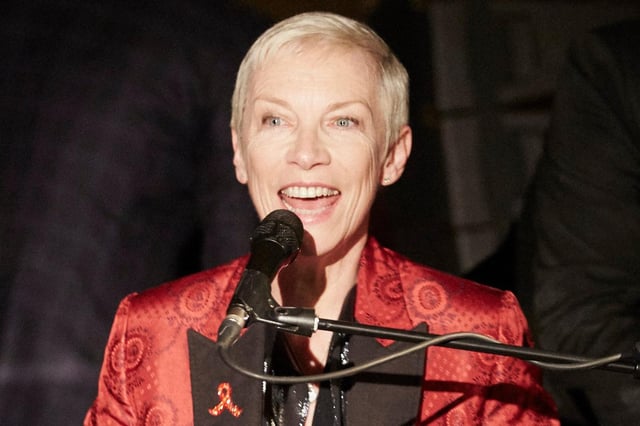Churches burnt as thousands mark Chile protest movement anniversary
BURNING IS NOT VIOLENT IT IS VANDALISM
BURNING IS NOT VIOLENT IT IS VANDALISM
Issued on: 19/10/2020
Santiago (AFP)

The spire of a church set on fire topples during a protest against Chile's government, on the one-year anniversary of the protests and riots that rocked the capital in 2019, in Santiago, Chile, October 18, 2020. © REUTERS - Ivan Alvarado
Two churches were torched as tens of thousands of demonstrators gathered Sunday in a central Santiago square to mark the anniversary of a protest movement that broke out last year demanding greater equality in Chile.
The demonstration comes just a week before Chileans vote in a referendum on whether to replace the dictatorship-era constitution -- one of the key demands when the protest movement began on October 18, 2019.
While the morning brought a largely festive atmosphere to the protests at Plaza Italia, there were several incidents of violence, looting and vandalism in the afternoon.
One church close to Plaza Italia was burnt to the ground as hooded protesters cheered, while a second place of worship was looted and also suffered fire damage.
Firefighters managed to get that blaze under control, though.
The small Church of the Assumption that was totally destroyed is known as the "artists' parish," according to local press.
There were clashes between groups of football hooligans in one Santiago neighborhood, while protesters in Plaza Italia doused a statue with red paint.
The communist mayor of a neighborhood near the central square, Daniel Jadue, was hounded out of Plaza Italia by protesters.
Yet it was a different feeling in the morning when demonstrators, many wearing masks to protect against the coronavirus pandemic, held up banners, sang and danced. Police even gradually pulled back from the Plaza Italia.
"It's great, very good and positive. They're pure good things for Chile in everything from here," demonstrator Viviana Donoso, 43, told AFP as she and a group of people danced to drums.
"The people of Chile need to unite, and we have to believe that we can do things."
Some even turned up to the demonstration in fancy dress.
- Hopes of a 'fairer Chile' -
For Victor Hugo de la Fuente, a journalist and manager at the Chilean edition of Le Monde Diplomatique, happiness reigned amongst protesters "due to the possibility of progressing and achieving a fairer and more democratic Chile."
Demonstrators also called for their countrymen to vote to "approve" the proposed constitutional change.
"This is the opportunity to say enough! We're here and we're going to vote for 'Approve,'" Paulina Villarroel, a 29-year-old psychologist, told AFP.
The government of President Sebastian Pinera -- one of the protesters' main targets -- called on demonstrators to be peaceful and to respect coronavirus restrictions.
The deadly outbreak has left 13,600 Chileans dead with more than 490,000 infected.
Protests broke out a year ago initially as a response to a hike in metro fares, before mushrooming into a general demonstration against inequality and the government.
On one night of unrest, a dozen metro stations were set ablaze, bus stops were smashed, supermarkets looted, buildings vandalized and protesters clashed with riot police who fired tear gas and used water cannons.
© 2020 AFP
Issued on: 19/10/2020 -
Text by:NEWS WIRES

Tens of thousands of Chileans gathered in the central square of Santiago to mark the one-year anniversary of mass protests that left over 30 dead and thousands injured, with peaceful rallies on Sunday devolving by nightfall into riots and looting
People gathered early in the day in demonstrations downtown and in cities throughout Chile that gained size and fervor through the evening. Many touted signs and rainbow colored homemade banners calling for a "yes" vote next Sunday in a referendum over whether to scrap the country's dictatorship-era Constitution, a key demand of the 2019 protests.
The demonstrations, while largely peaceful early on, were marred by increasing incidents of violence, looting of supermarkets and clashes with police across the capital later in the day. Fire truck sirens, burning barricades on roadways and fireworks on downtown streets added to a sense of chaos in some neighborhoods.
Interior Minister Victor Perez spoke late in the evening, praising the early, peaceful rallies while blasting the late-night mayhem. He called on Chileans to settle their differences by voting in the upcoming Oct. 25 constitutional referendum.
"Those who carry out these acts of violence do not want Chileans to solve our problems through democratic means," Perez told reporters, vowing to punish those who crossed the line Sunday.
Early in the day, an angry mob jeered and threatened a Communist Party mayor. Later, masked individuals firebombed a police headquarters and church. Vandals attacked another Santiago church in the early evening, setting its spire aflame and choking side streets with smoke.
More than 15 metro stations were temporarily closed amid the unrest. Police fired tear gas and water cannons in skirmishes with sometimes violent, hooded and masked people.
Last year's protests, which began Oct. 18, raged until mid-December as Chileans gathered nationwide to call for reforms to the pension, healthcare and education systems.
Rioting and looting resulted in billions of dollars in damage and losses to the country's businesses and infrastructure. The unrest saw the military take to the streets for the first time since the rule of dictator Augusto Pinochet.
Police estimated that Sunday's rally in Santiago attracted around 25,000 people by 6 p.m., far smaller than the largest protests of 2019.
In the past few days, small-scale demonstrations and isolated incidents of violence have nonetheless resurfaced in Chile, as the capital's 6 million citizens emerge from months of confinement following the COVID-19 pandemic.
Most demonstrators on Sunday wore masks, but many could be seen in tight groups, raising concerns about a potential health risk.
(REUTERS)

Demonstrators set a police vehicle on fire during clashes between security forces and protesters marking the first anniversary of Chile's social unrest over inequality
Martin BERNETTI AFP
Tens of thousands of Chileans gathered in the central square of Santiago to mark the one-year anniversary of mass protests that left over 30 dead and thousands injured, with peaceful rallies on Sunday devolving by nightfall into riots and looting
People gathered early in the day in demonstrations downtown and in cities throughout Chile that gained size and fervor through the evening. Many touted signs and rainbow colored homemade banners calling for a "yes" vote next Sunday in a referendum over whether to scrap the country's dictatorship-era Constitution, a key demand of the 2019 protests.
The demonstrations, while largely peaceful early on, were marred by increasing incidents of violence, looting of supermarkets and clashes with police across the capital later in the day. Fire truck sirens, burning barricades on roadways and fireworks on downtown streets added to a sense of chaos in some neighborhoods.
Interior Minister Victor Perez spoke late in the evening, praising the early, peaceful rallies while blasting the late-night mayhem. He called on Chileans to settle their differences by voting in the upcoming Oct. 25 constitutional referendum.
"Those who carry out these acts of violence do not want Chileans to solve our problems through democratic means," Perez told reporters, vowing to punish those who crossed the line Sunday.
Early in the day, an angry mob jeered and threatened a Communist Party mayor. Later, masked individuals firebombed a police headquarters and church. Vandals attacked another Santiago church in the early evening, setting its spire aflame and choking side streets with smoke.
More than 15 metro stations were temporarily closed amid the unrest. Police fired tear gas and water cannons in skirmishes with sometimes violent, hooded and masked people.
Last year's protests, which began Oct. 18, raged until mid-December as Chileans gathered nationwide to call for reforms to the pension, healthcare and education systems.
Rioting and looting resulted in billions of dollars in damage and losses to the country's businesses and infrastructure. The unrest saw the military take to the streets for the first time since the rule of dictator Augusto Pinochet.
Police estimated that Sunday's rally in Santiago attracted around 25,000 people by 6 p.m., far smaller than the largest protests of 2019.
In the past few days, small-scale demonstrations and isolated incidents of violence have nonetheless resurfaced in Chile, as the capital's 6 million citizens emerge from months of confinement following the COVID-19 pandemic.
Most demonstrators on Sunday wore masks, but many could be seen in tight groups, raising concerns about a potential health risk.
(REUTERS)
Issued on: 18/10/2020 -
Santiago (AFP)
Thousands of demonstrators gathered Sunday in a central Santiago square to mark the anniversary of a protest movement that broke out last year demanding greater equality in Chile.
The demonstration comes just a week before Chileans vote in a referendum on whether to replace the dictatorship-era constitution -- one of the key demands when the protest movement began on October 18, 2019.
There was a festive atmosphere on the Plaza Italia as demonstrators, many wearing masks to protect against the coronavirus pandemic, held up banners, sang and danced.
There were isolated clashes with police, who gradually pulled back from the central square.
"It's great, very good and positive. They're pure good things for Chile in everything from here," demonstrator Viviana Donoso, 43, told AFP as she and a group of people danced to drums.
"The people of Chile need to unite, and we have to believe that we can do things."
For Victor Hugo de la Fuente, a journalist and manager at the Chilean edition of Le Monde Diplomatique, happiness reigned amongst protesters "due to the possibility of progressing and achieving a fairer and more democratic Chile."
Demonstrators also called for their countrymen to vote to "approve" the proposed constitutional change.
"This is the opportunity to say enough! We're here and we're going to vote for 'Approve,'" Paulina Villarroel, a 29-year-old psychologist, told AFP.
The government of President Sebastian Pinera -- one of the protesters' main targets -- called on demonstrators to be peaceful and to respect coronavirus restrictions.
The deadly outbreak has left 13,600 Chileans dead with more than 490,000 infected.
Thousands of demonstrators gathered Sunday in a central Santiago square to mark the anniversary of a protest movement that broke out last year demanding greater equality in Chile.
The demonstration comes just a week before Chileans vote in a referendum on whether to replace the dictatorship-era constitution -- one of the key demands when the protest movement began on October 18, 2019.
There was a festive atmosphere on the Plaza Italia as demonstrators, many wearing masks to protect against the coronavirus pandemic, held up banners, sang and danced.
There were isolated clashes with police, who gradually pulled back from the central square.
"It's great, very good and positive. They're pure good things for Chile in everything from here," demonstrator Viviana Donoso, 43, told AFP as she and a group of people danced to drums.
"The people of Chile need to unite, and we have to believe that we can do things."
For Victor Hugo de la Fuente, a journalist and manager at the Chilean edition of Le Monde Diplomatique, happiness reigned amongst protesters "due to the possibility of progressing and achieving a fairer and more democratic Chile."
Demonstrators also called for their countrymen to vote to "approve" the proposed constitutional change.
"This is the opportunity to say enough! We're here and we're going to vote for 'Approve,'" Paulina Villarroel, a 29-year-old psychologist, told AFP.
The government of President Sebastian Pinera -- one of the protesters' main targets -- called on demonstrators to be peaceful and to respect coronavirus restrictions.
The deadly outbreak has left 13,600 Chileans dead with more than 490,000 infected.



